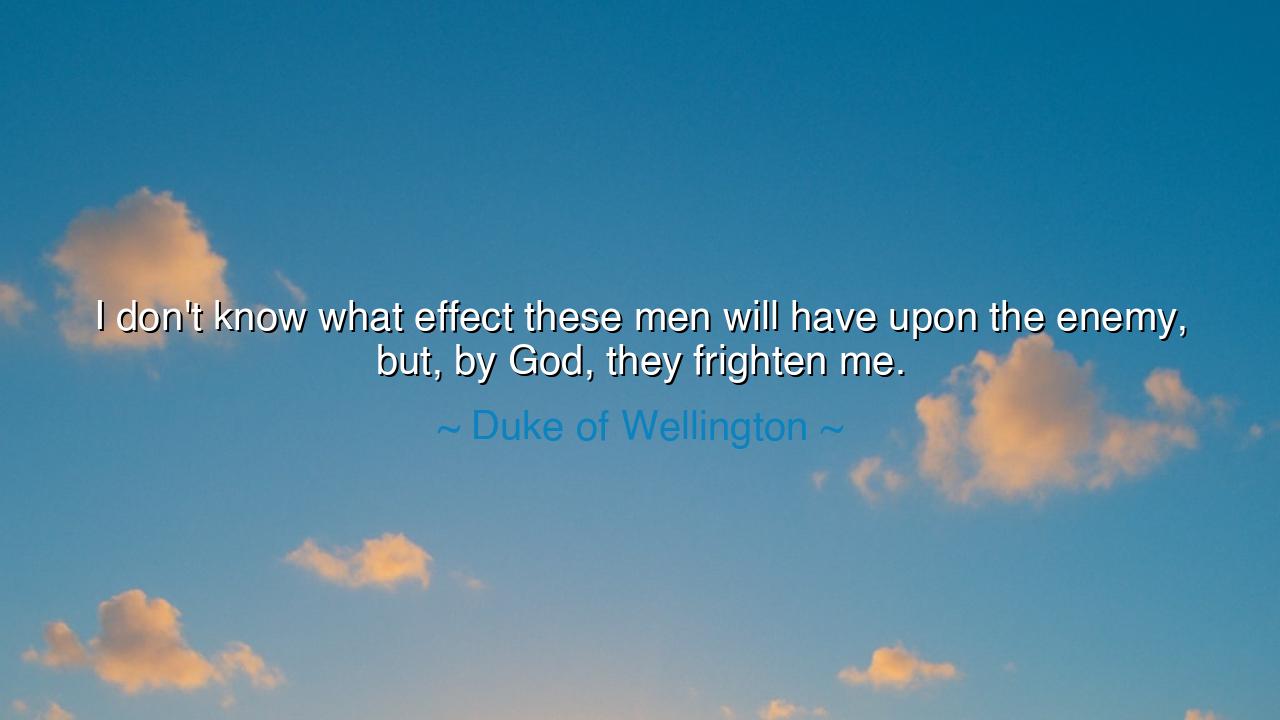
I don't know what effect these men will have upon the enemy, but
I don't know what effect these men will have upon the enemy, but, by God, they frighten me.






Hear the fierce and unforgettable words of the Duke of Wellington, the Iron Commander of Britain, who once declared: “I don’t know what effect these men will have upon the enemy, but, by God, they frighten me.” In this sentence, both sharp and human, we glimpse the heart of a soldier and the burden of leadership. It is the cry of a man who has looked upon the faces of warriors—men hardened by war, fierce in spirit, and unpredictable in their courage—and felt both awe and fear. For Wellington, though born of nobility and discipline, was no stranger to the chaos of battle. His words speak of the eternal tension between order and fury, between command and the untamed strength that surges within those who fight for their cause.
The origin of this quote is rooted in the early 19th century, during the age of the Napoleonic Wars. The Duke of Wellington—Arthur Wellesley—uttered these words as he surveyed the ranks of his own troops before battle. He was addressing the soldiers of the British Army, rough men drawn from taverns, fields, and city slums, many of them illiterate, hardened by poverty, and bound by iron discipline. Yet within them burned a raw, elemental power—the kind of ferocity that could win wars but also defy control. Wellington, a man of precision and order, knew that such men were both his greatest weapon and his gravest danger. They could break the enemy—but if loosed without restraint, they could just as easily destroy themselves. His remark was both admiration and unease, a recognition of the terrible majesty of human will when unshackled by fear.
This quote reveals a profound truth about the nature of strength: that power and chaos often dwell side by side. The Duke did not speak as a coward, but as a man who understood the cost of unleashing such might. To lead men into battle is not merely to command bodies, but to command souls—each filled with passion, rage, and desperation. The greatest generals, like Wellington, knew that courage is not the absence of fear, but its mastery. Yet here, he admits a rare humility: even he, the conqueror of Napoleon at Waterloo, trembled before the intensity of the men he led. They were dangerous not because they lacked discipline, but because within them lived a wild energy that transcended reason.
Consider, then, the battle of Waterloo, that thunderous clash which decided the fate of Europe. Wellington’s army stood firm against Napoleon’s veterans, outnumbered and exhausted, yet unbroken. The fields ran red, the sky shook with cannon fire, and amidst the smoke and blood, those very men whom Wellington had once feared held their ground. They fought like lions, not merely out of loyalty, but out of defiance, rage, and raw human will. When the French Imperial Guard advanced—the finest soldiers in Europe—the British lines refused to yield. It was not polished strategy that saved the day, but the terrible courage of men who would not bow. Thus, the Duke’s fearful admiration proved true: the same fury that frightened him became the weapon that won his glory.
Wellington’s words also speak to the paradox of leadership itself. To lead others, one must love their strength but respect their danger. Great leaders do not seek to erase the wildness of men, but to channel it. The wise understand that the fire of courage is sacred, yet volatile; it must be guided, not extinguished. The Duke, in his honesty, shows that true authority does not rest in arrogance, but in reverence for the power of others. He was a man who knew that those who fight for you are not merely instruments—they are forces of nature. To command them is to hold lightning in your hand.
This truth extends beyond the battlefield. Every age, every generation, has its warriors—those whose passion, conviction, and power frighten even their allies. In art, in science, in justice, and in faith, the same rule applies: the ones who shake the world are not always tame. The reformers, the inventors, the prophets—they are all “men who frighten,” because they carry within them the spark of change. The wise do not destroy such spirits; they harness them. For though their presence may unsettle us, their courage builds the future.
Therefore, let this teaching be remembered: the power that terrifies can also transform. The Duke’s fear was not weakness—it was wisdom. He knew that greatness walks hand in hand with danger, and that the line between destruction and victory is drawn by discipline, vision, and faith. So, too, in our own lives, we must learn to master the fires within us—to use passion without letting it consume us, to lead with strength yet bow to humility.
And so, O seeker of truth and courage, remember the lesson of the Duke of Wellington: do not fear the power within or around you, but respect it. Whether you command armies or only your own soul, know that fear can be a teacher, showing you where strength lies hidden. For in the end, as Wellington knew, it is often the ones who frighten us most—the fierce, the bold, the unyielding—who win the day and change the world.






AAdministratorAdministrator
Welcome, honored guests. Please leave a comment, we will respond soon